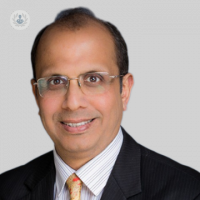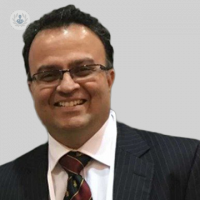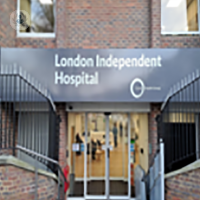What is obesity surgery?
Obesity surgery, otherwise known as bariatric or weight-loss surgery, describes a range of procedures that are designed to treat people with obesity. Whilst there are different types of gastric surgery, the aim of the procedure is always to reduce the size of the stomach. General surgeons perform obesity surgery.

Why would you do it?
Bariatric surgery is a type of treatment for people who are obese. The surgery helps a person to lose weight and is generally carried out to reduce the risk of serious weight-related health problems which can be potentially life-threatening.
Over time, obesity can lead to multiple conditions such as heart disease, diabetes, high blood pressure, and an increased risk of stroke.
As a general rule, bariatric surgery is usually for those with a BMI of over 40 or those with a BMI of over 35, accompanied by a serious weight-related health problem.
What does it involve?
Some of the most common procedures, aimed at reducing the size of the stomach and making the patient feel full sooner and/or decreasing the ability to absorb nutrients are as follows:
- A gastric band can be fitted around the stomach in order to reduce its size. The band is usually placed around the top part of the stomach and is adjustable.
- A gastric bypass joins the top part of the stomach to the small intestine, thereby bypassing most of the stomach and small intestine.
- A sleeve gastrectomy removes part of the stomach, decreasing its volume significantly.
All types of weight loss surgery are done under general anaesthetic. Depending on the circumstances, the operation can be performed using open surgery or laparoscopically using smaller incisions and cameras to guide the process. The latter is also known as keyhole surgery.
How should one prepare for obesity surgery?
Preparation for obesity surgery will depend on the individual to an extent. Restrictions are often placed on food and drink prior to surgery and certain medications may also need to be stopped for a period.
What does recovery time involve?
Obesity surgery is a major operation and patients will normally wake up in a recovery room before being moved to a ward. There is no food or drink allowed for the first couple of days to allow the stomach and digestive system time to heal.
After that, patients can progress to clear liquids and are often discharged around three days after surgery, providing everything goes well. A specific diet will then need to be followed for some weeks after surgery, usually centered on liquids and soft foods.
Permanent lifestyle changes after surgery are also required to help keep weight off. Regular exercise and a balanced diet should be maintained to ensure that patients don’t put the weight they have lost back on.
11-13-2012 07-19-2023Obesity surgery
What is obesity surgery?
Obesity surgery, otherwise known as bariatric or weight-loss surgery, describes a range of procedures that are designed to treat people with obesity. Whilst there are different types of gastric surgery, the aim of the procedure is always to reduce the size of the stomach. General surgeons perform obesity surgery.

Why would you do it?
Bariatric surgery is a type of treatment for people who are obese. The surgery helps a person to lose weight and is generally carried out to reduce the risk of serious weight-related health problems which can be potentially life-threatening.
Over time, obesity can lead to multiple conditions such as heart disease, diabetes, high blood pressure, and an increased risk of stroke.
As a general rule, bariatric surgery is usually for those with a BMI of over 40 or those with a BMI of over 35, accompanied by a serious weight-related health problem.
What does it involve?
Some of the most common procedures, aimed at reducing the size of the stomach and making the patient feel full sooner and/or decreasing the ability to absorb nutrients are as follows:
- A gastric band can be fitted around the stomach in order to reduce its size. The band is usually placed around the top part of the stomach and is adjustable.
- A gastric bypass joins the top part of the stomach to the small intestine, thereby bypassing most of the stomach and small intestine.
- A sleeve gastrectomy removes part of the stomach, decreasing its volume significantly.
All types of weight loss surgery are done under general anaesthetic. Depending on the circumstances, the operation can be performed using open surgery or laparoscopically using smaller incisions and cameras to guide the process. The latter is also known as keyhole surgery.
How should one prepare for obesity surgery?
Preparation for obesity surgery will depend on the individual to an extent. Restrictions are often placed on food and drink prior to surgery and certain medications may also need to be stopped for a period.
What does recovery time involve?
Obesity surgery is a major operation and patients will normally wake up in a recovery room before being moved to a ward. There is no food or drink allowed for the first couple of days to allow the stomach and digestive system time to heal.
After that, patients can progress to clear liquids and are often discharged around three days after surgery, providing everything goes well. A specific diet will then need to be followed for some weeks after surgery, usually centered on liquids and soft foods.
Permanent lifestyle changes after surgery are also required to help keep weight off. Regular exercise and a balanced diet should be maintained to ensure that patients don’t put the weight they have lost back on.


Post-bariatric surgery: is it still possible to gain weight?
By Mr Ahmed R. Ahmed
2024-12-21
After undergoing weight loss surgery and successfully losing weight, one of your biggest concerns may be that you’ll start regaining weight again. Although at this point it is uncommon, it can happen, and sometimes, doctors even expect there to be a little weight gain. A leading London surgeon, Mr Ahmed R Ahmed, explains this in more depth. See more


"Why this is the best weight loss surgery for you – what I would choose for you as your obesity surgeon”
By Mr Ali Alhamdani
2024-12-21
There are many different things which must be considered when deciding on the right path to follow for weight loss surgery. Top surgeon Mr Ali Alhamdani explains how he decides the best course of action and procedure for the patient. See more


Understanding both metabolic and bariatric surgery
By Mr Sanjay Agrawal
2024-12-20
Metabolic syndrome is the name of a cluster of conditions that occur together and increase the risk of developing type 2 diabetes, which is why metabolic surgery is an effective option for patients with this condition. Here, leading weight loss surgeon Mr Sanjay Agrawal explains if metabolic surgery differs from bariatric. See more


The gastric sleeve procedure: a popular weight loss surgery
By Mr Sanjay Agrawal
2024-12-20
Gastric sleeve surgery is just one of several weight loss surgical procedures. These are used to treat obesity when non-surgical measures haven’t worked. Mr Agrawal is a leading weight loss surgeon and, in this article, he explains why gastric sleeve surgery is the most common bariatric procedure, who’s eligible, the possible complications and how much weight you can expect to lose. See more
Experts in Obesity surgery
-
Mr Sanjay Agrawal
SurgeryExpert in:
- Weight loss injections
- Obesity surgery
- Bariatric surgery
- Gastric band
- Gallstones
- Hernia
-
Mr Majid Hashemi
SurgeryExpert in:
- Gastric sleeve
- Achalasia
- Acid reflux
- Hiatal hernia
- Gastric bypass
- Obesity surgery
-
Mr Michael Van den Bossche
SurgeryExpert in:
- Obesity surgery
- Hernia
- Cholelithiasis (gallstones)
- Acid reflux
- Weight loss
- Laparoscopy
-
Mr Bart Decadt
SurgeryExpert in:
- Obesity surgery
- Gastric sleeve
- Gastric band
- Gastric bypass
- Acid reflux
- Gallbladder surgery
-
Mr Vittal Rao
SurgeryExpert in:
- Laparoscopic hernia surgery
- Gallbladder surgery
- Acid reflux
- Obesity surgery
- Hernia
- Medicolegal
- See all

Cleveland Clinic London Hospital
Cleveland Clinic London Hospital
33 Grosvenor Place
No existe teléfono en el centro.
By using the telephone number provided by TOP DOCTORS, you automatically agree to let us use your phone number for statistical and commercial purposes. For further information, read our Privacy Policy
Top Doctors

Infinity Surgery
Infinity Surgery
Nuffield Hospitals - North Staffordshire, Clayton Rd, Newcastle-under-Lyme ST5 4DB, United Kingdom
No existe teléfono en el centro.
By using the telephone number provided by TOP DOCTORS, you automatically agree to let us use your phone number for statistical and commercial purposes. For further information, read our Privacy Policy
Top Doctors

The London Independent Hospital - part of Circle Health Group
The London Independent Hospital - part of Circle Health Group
1 Beaumont Square, Stepney Green
No existe teléfono en el centro.
By using the telephone number provided by TOP DOCTORS, you automatically agree to let us use your phone number for statistical and commercial purposes. For further information, read our Privacy Policy
Top Doctors
-
Cleveland Clinic London Hospital
33 Grosvenor Place, Central LondonExpert in:
- Cardiology
- Colorectal surgery
- Minimal access surgery (keyhole surgery)
- Gallbladder surgery
- Diagnostic Imaging
- Ultrasound
-
Infinity Surgery
Nuffield Hospitals - North Staffordshire, Clayton Rd, Newcastle-under-Lyme ST5 4DB, United Kingdom, Newcastle-under-LymeExpert in:
- Achalasia
- Bariatric Surgery
- Hiatal hernia surgery
- Gallbladder surgery
- Acid reflux
- Laparoscopic hernia surgery
-
The London Independent Hospital - part of Circle Health Group
1 Beaumont Square, Stepney Green, East LondonExpert in:
- Cataracts
- Bariatric Surgery
- Maxillofacial Surgery
- Neurological spinal surgery
- Orthopaedic surgery
- Orthopaedic spinal surgery
- See all
- Most viewed diseases, medical tests, and treatments
- Weight loss injections
- Nipple discharge
- Abdominal pain
- Endovenous laser treatment (EVLA)
- Minimal access surgery (keyhole surgery)
- Head and neck cancer
- Neck lump
- Bariatric surgery
- Acellular dermal matrix (ADM)
- Prepectoral breast reconstruction








